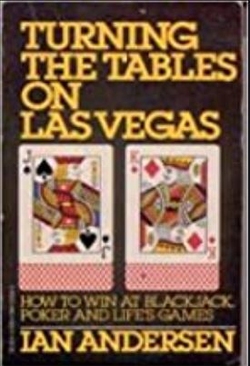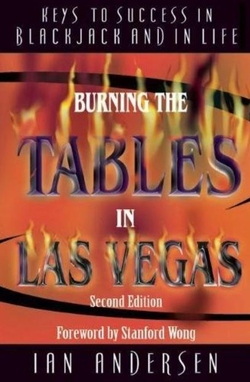 What makes Ian Anderson such an interesting character in the blackjack world, is that despite being active for at least 50 years, no one has any idea who he is.
What makes Ian Anderson such an interesting character in the blackjack world, is that despite being active for at least 50 years, no one has any idea who he is.
He is an enigma, having published two books 20 years apart and refusing all invitations to public events, including his annual invite to Max Rubin’s blackjack ball and the ceremony when he was inducted into the blackjack hall of fame.
This suggests that he has been happily, and secretly, making a nice living from gambling for pretty much his whole life, and where others chose disguises, location changes, or other cover ups in order to avoid being banned, Anderson has simply never revealed his true identity.
That fact will make this article relatively short, but the man of mystery is definitely worth including in our list of famous blackjack players precisely because so little is known about him.
1976: Turning the Tables on Las Vegas
 This was the title of the book that made Anderson a name for himself in blackjack circles. While it included card counting techniques like others before it had done, what made this book different was its attention to detail in other areas.
This was the title of the book that made Anderson a name for himself in blackjack circles. While it included card counting techniques like others before it had done, what made this book different was its attention to detail in other areas.
Like so many card counting techniques, those in the book are now mostly redundant thanks to new rules and anti-counting strategies employed by the casinos, but the psychology he talks about remains valid.
When the book was published it was the first of its’ kind. It covered in great detail how to blend in and come across as a regular bettor, how to psychologically beat the casino as well as how to do it mathematically.
It included tips on picking tables, dealers, tipping, stake sizes, emotional regulation; in short, he placed as much importance on how to behave as on how to count cards.
The book was a slow starter but those in the know saw its quality and sales gathered momentum, first among blackjack professionals and then with more recreational players.
After that, no one heard from Ian Anderson again for 20 years.
1999: Burning the Tables in Las Vegas
 Anderson’s second book hit the shelves after more than two decades of silence, although it revealed very little else about the author himself. If indeed he truly is a he, and ‘Ian Anderson’ is not a gender swap pseudonym.
Anderson’s second book hit the shelves after more than two decades of silence, although it revealed very little else about the author himself. If indeed he truly is a he, and ‘Ian Anderson’ is not a gender swap pseudonym.
The book itself can be thought of as an updated version of his first, with extra detail and advice more relevant to the modern player. It is also full of stories and anecdotes, and includes a foreword by Stanford Wong, whom Ian Anderson must trust implicitly since he knows his true identity.
Again, this book goes deeper than simply explaining advantage play in blackjack, indeed its’ sub heading is “Keys to Success in Blackjack and in Life”. The psychology aspect plays a huge role once more and proves that, whoever Anderson is, he has an extremely high emotional IQ.
Subjects covered include: game selection, relationships with casino employees, disguises, backstories, longevity in your favourite caisnos, how to behave, fake ID, attire, how to handle heat from the casino, risk, even diet. It also explains how your interaction with others can affect your performance.
So Who is Blackjack’s Ian Anderson?

The simple answer is, no one has any idea other than a very small number of people who Anderson knows personally.
We know he has been active since the 60s though, which makes him an old man these days. Even if he released his first book when he was 21, which is unlikely, it would make him at least 67 in 2021. More likely though he had been playing for at least 5 years before then, so our best guess would be that he is in his mid to late 70s, if he is even still alive.
He went against type and agreed to a filmed interview in 2005. This was for a documentary called ‘The Hot Shoe’ which you can watch here. His image is blacked out but his voice is clear, and it’s as close as we are likely to get.
We know from the small nuggets of info he gives us in his books that he played for decades in Las Vegas and read Edward O Thorpe’s book in 1962; and in his interview for the Hot Shoe documentary his accent is most definitely American, perhaps with a tinge of something else in there, but it’s minor, so his nationality can be assumed.
There are some theories about Scottish heritage due to his pseudonym also being the name of a Scottish musician from the band, Jethro Tull, but this feels more like coincidence to us.
His true identity may never be learned, but his name will remain legendary for many years to come, and who knows, he could be playing right next to you and you wouldn’t even know it.
